
With Starships released, an expansion for Beyond Earth announced, and support for Civ V apparently done, I thought it would be a good time to take a look back at the game. I'm going to spend a few posts to discuss what Civ V did right, and what it did wrong, so that future games can learn lessons from this iteration's successes and failures.
Here I will present a Top 10 list of my favorite new features, mechanics, and design philosophies in Sid Meier's Civilization V (and its two expansion). These are the elements of the game that stood out the most to me as contributing to the fun and addictiveness of the game, and which push the series in positive directions. Most of these features are things that I would probably like to see return in future sequels.
But even though my intent here is to shine glowing praise on Civ V, I'm not going to ignore the faults of even my favorite features. Some of these mechanics are great ideas, but still suffered from problems in execution. So I won't shy away from constructive criticism where applicable, and I'll make recommendations to improve these great features in the future.
In a future post, I will also look at the things that Civ V got wrong.
Of course, any list of "good ideas" or "bad ideas" is going to be subjective. You may not agree with my opinions, and that's OK. If there's any features, mechanics, or design decisions that you really love in Civilization V, its DLC, or its two expansions, please feel free to leave a comment!
Customizable religion
The abstract Piety social policy tree of vanilla Civ V was a fairly weak representation of religion in the game. I understood that the idea was to keep the game politically correct and inoffensive, since there were complaints that some religions in Civ IV were better than others due to when they appeared in the tech tree and the preferences of the civ A.I.s that usually founded them.
So when Gods & Kings added a whole new, customizeable, religion mechanic, I was very pleased to see this important element of human history be more fleshed out and balanced. The different religions basically became arbitrary labels and weren't inherently different. This negated the risk of the religions in the game being offensive to their real-world adherents, so that they could actually do things in-game. This allowed them to have more functionality than Civ IV,'s religions, which were mostly just diplomatic modifiers and an economic boost.
The pantheon system was also a nice intermediary step. It gives civs some early customization options, and it also allowed less formal, tribalistic religious beliefs to be somewhat represented in the game.
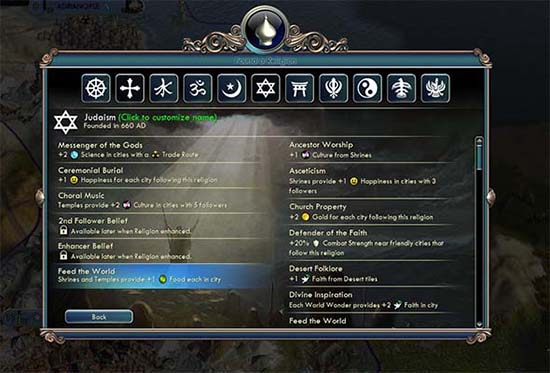
The customization religions require much more investment, and feel less arbitrary than in Civ IV.
My only complaints with the system is that so many of the civs with high religious flavor (Celts, Byzantium, Spain, etc) insisted on founding the same two religions (usually Protestantism and Catholicism). And many spiritual ancient civs (India, Persia, Egypt, China, Japan, etc) weren't given any religious powers or significant religious flavor. So ancient religions like Zoroastrianism, Judiasm, Budhism, and Hinduism were rarely founded at the beginning of the game. Other civs that were very religoius (India, Egypt, and so on) weren't given any faith or religion buffs, so they don't adopt religions as quickly as they should.
I also am annoyed that civs don't have back-up religious preferences. So if the religion that they want to found is no longer available, they just found the first religion that is available alphabetically.
But overall, this feature was excellently implemented, and added a lot of fun customization and flavor to the game.
Pact of secrecy and preparing for war
The Pact of Secrecy is ironic because it's the only feature on this list that was actually removed in a game update. For those of you who remember the vanilla release of the game, there was a diplomacy feature that allowed two players to declare a "Pact of Secrecy" against a third civ. It was a secret agreement between the two players to undermine or conspire against the third party.
I loved this feature in principle. It substituted for Civ IV's "What do you think of ... [leader]?" diplomatic option that does not appear in Civ V. It allowed players to agree that they have a common enemy without having to necessarily go to war against that enemy. The feature proved unpopular, and didn't really do much mechanically. The developers didn't think it would fit in with updating the game to show colored diplomatic modifiers, so it was completely removed...
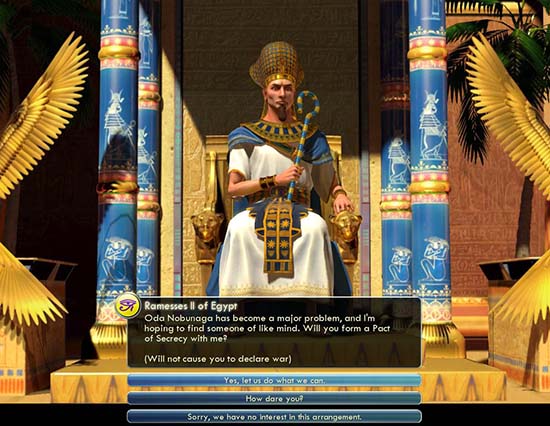
Pacts of Secrecy allowed civs to conspire against each other without open declarations of war,
but they were removed in an early diplomacy patch because of ... reasons?
This was sad, for me, because I think that it wasn't necessary to remove this feature. Even with the diplomatic modifiers being added, there are still times when the A.I.s will become deceptive. So there's no reason why the Pact of Secrecy couldn't have been retained and just not displayed in the diplomacy modifier tooltip. The feature could also have been expanded and integrated well into Brave New World's enhanced U.N. feature. It would have allowed you to know that you would have support in your attempts to embargo or otherwise thwart a rival civ, and would have added an extra layer to the backdoor politics that the feature encourages.
It also had potential to play well with Gods & Kings' espionage feature, since uncovering such plots would be a valuable effect of spying on other civs. In fact, discovering that another civ is plotting against someone is one of the effects of spies in Gods & Kings. So A.I.s are still capable of "Pacts of Secrecy" with themselves against another civ. Further, if two human players establish a pact of secrecy against a third player, then spies would be able to reveal that information. So there was a lot of potential here that sadly went squandered.
But despite its limitations, I think that this idea was a very good one in concept. I wouldn't mind seeing this feature re-appear in future games, as long as it is cleaned-up and stabilized, and given more mechanical relevance.
Another new and similar diplomatic feature is the ability to ask for a 10 turn buffer in order to prepare for a mutual declaration of war. This addition is a brilliant addition to Civ V's diplomacy. It helps to make the game exciting, since you don't necessarily have to reject another civ's invitation to war out of hand if you aren't prepared to engage in a fight.
In previous games, I would often reject war alliances because the immediate declaration of war would leave my undefended borders vulnerable. This new "give me 10 turns to prepare" feature lead to a lot more wars [for me], since the preparation buffer allowed me to mobilize an army (if necessary) and move my troops to what will be the front line.
Tactical 1upt, hex-based combat
The change to more tactical combat is a very fundamental change in Civilization V that has proven to be very popular. It makes war much more interesting and enjoyable, and adds some challenges that weren't present in previous games that just relied on stacking as many units as possible and sweeping across the map. Terrain and space availability becomes a significant element of gameplay, since obstacles may require units to slowly funnel through a bottleneck instead of all marching across in unison.
The actual combat rules also significantly improved gameplay. Instead of units always dueling to the death, they can hurt each other and retreat. Players can feel more free to use more of their units, and don't have to worry as much about sacrificing a highly-experienced unit due to an unlucky dice roll. It makes combat more enjoyable, and also more realistic.
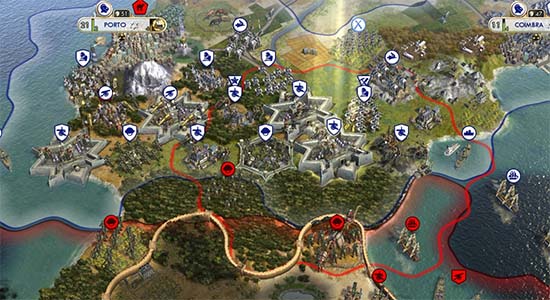
Combat requires much more active participation, and terrain is actually relevant!
The A.I. isn't particularly good tactically, unfortunately, so single-player suffers from being too easy. A decent player should easily be able to achieve between a 5-to-1 or a 10-to-1 kill ratio against A.I. units. The game also isn't really scaled properly for this level of war granularity. That is why this feature is also the only feature to also appear on my list of Top 10 bad ideas for Civ V.
The change to a hexagonal grid is also a very fundamental change to the game. It, combined with the 1-upt rule, radically changes how units move across the map. Mostly,it makes movement much more intuitive. You don't have to worry about wondering whether you can walk across a caddy-corner, and it doesn't require any special design considerations to be made for diagonal movement.
It also makes the game look a lot prettier! Maps are much more organic, and don't have the rigid straight lines and hard angles that made the environments of earlier Civs look artificial.
Cumulative cultural progress (i.e. social policies)
Much like how religions gave an opportunity for customizing your civilization in Civ V, I also really like the idea of having cumulative cultural progress. While I do miss the Civic system of Civ IV, I do like how the social policies give you a sense of forward progress in the development of your civilization's culture. It gives the impression that your civilization is growing socially; rather than just militarily, economically, or technologically.
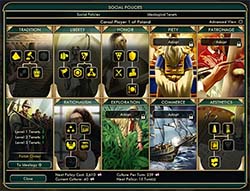
Social policies give the feeling that my civilization is advancing sociologically, in addition to technologically and economically.
Culture isn't just a passive, abstract concept that you just let grow and forget about. In Civ IV, culture just expands your borders and eventually, possibly, leads to a cultural victory if you accumulate enough. There were some mechanics about city-flipping and so forth, but they were all passive and mostly irrelevant to the game.
Civ V allows the player to actively shape the culture of the civilization's society. In addition, your choices provide benefits that makes culture more relevant to the game as a whole. It's something that is worth pursuing regardless of your end victory goals.
The only weakness is that the linear cultural development of Civ V lacks any revolutionary strategic options. That's "revolutionary" in the sense that you can never abandon old elements of your culture, and in fact, there's never any need to do this. There's never any real cost-benefit analysis to be done when selecting a new social policy, since you never lose anything and the policies never have any negative consequences (with some minor, indirect exceptions). The only cost is the opportunity cost of not being able to take another policy. This is especially true in Brave New World now that social policy trees aren't mutually exclusive anymore, and it's compounded by imbalances in the trees that make some (tradition and rationalism) much more powerful than others.
Strategic resource supply
Having to manage a supply of strategic resources is a great tactical addition to Civ V. It forces the players into conflict because continued expansion actually requires the acquisition of additional resources. In Civ IV, once you have a single source of iron, you were covered for the entire game. There was no reason to fight wars to gain more iron. But in Civ V, you'll need to keep expanding and acquiring new sources of resources in order to maintain your growing armies.
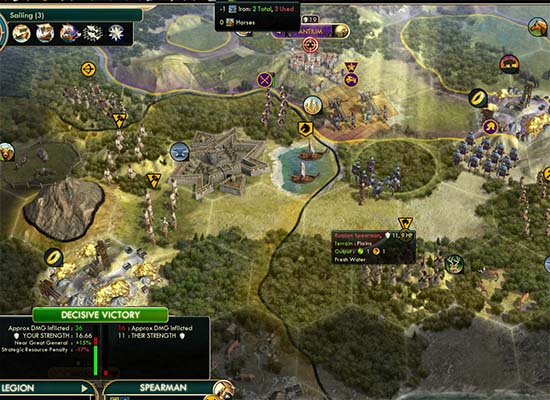
The need to accumulate more resources can actually by a catalyst for conflict now.
Resources are still fairly widely distributed, and so resource wars aren't as common as they maybe should be. And if a war is necessary, then the civ with the resource usually has a decisive advantage against the civilization that doesn't have it. So picking a fight to acquire a resource from a foe that does have it is usually futile. In addition, the strategic resources are rarely necessary for buildings or domestic development. In fact, once you have the building, losing access to the resource doesn't matter; the building still functions. So players are rarely required to go to war in order to acquire more resources to fuel their infrastructure.
I love the idea, but I hope that future versions of the game make the resources more useful in non-military applications and less useful for armies so that there is more competition for them, and a reason to build a military in order to acquire more.
Archaeology, great works, and tourism
I really like the great work and archaeology system in Brave New World. It added a great deal of flavor to the game, as well as an "exploration" and "discovery" mechanic that has always been missing from the later phases of Civilization games. In addition, the callbacks to the earlier periods of the game are fun and help create a small degree of narrative within a particular game.
Artifacts [LEFT] being a callback to earlier events in the game adds personality,
and I love being exposed to all the literature, art, and music [RIGHT] that the great people create.
I also love the educational aspects of Civilization. I enjoy learning about the different civilizations, their cultures, histories, military strategies, and so on. The great works added more elements of the humanities to the list of things that I learned about. It exposed me to new literature, art, and music.
Natural Wonders
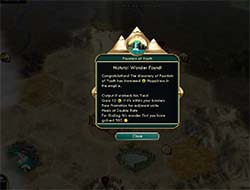
Natural wonders add another fun incentive to explore, as well as being something to fight over.
The introduction of natural wonders helped to add some excitement to the early exploration phases, as well as providing high-value tiles that civilizations might want to compete over, or race to claim as their own. It adds more flavor and personality to an individual game, as well as possibly providing a small source of conflict during the first half of the game. Civilization was always about the awe and wonder of mankind's achievements, but the inclusion of natural wonders also adds an element of awe and wonder about the natural world.
City states
Probably my single-favorite new feature of the game is the inclusion of city states. In Civ IV, I often liked to play on larger maps with additional civilizations present. It allowed the map to be populated with smaller nations that could be conquered and subjugated, or which can band together to threaten the larger civs (although that rarely ever happened). It also filled up the map more quickly and lead to more early-game territorial conflict.
Civ V's inclusion of city states accomplishes most of those goals without having to adjust game settings. It populates the map with small nations that the larger civilizations compete for control over, and it can create sources of early game conflict. It also allows for the game to represent other cultures that don't fit in as full, playable civilizations. Finally, the Canadians and Australians can stop complaining about "not being represented in Civ" ;)
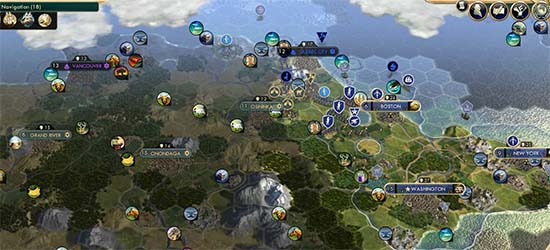
The inclusion of city states provides representation for more cultures than just the playable civs.
So there you go, Canada. You're finally in Sid Meier's Civilization ;)
Finding the city states is yet another exciting incentive to explore. The quests that city states offer adds some more active gameplay to early phases of the game as you compete to establish friendly relations. And once you've gotten your early exploration and settlement out of the way, accomplishing these quests adds something for the player to do if you aren't actively warring with other civs.
I love the concept of city states, but I am a bit disappointed that they are a bit too passive. I hope to see further expansion of this concept in future titles!
Notification-based user interface
The best interface and useability improvement of the game is the new notification system. Gone are the days of being immediately prompted to assign new build tasks and research objectives at the start of every turn without being able to look at other cities' queues first. Gone are the days of having to remember everything that happened during other players' turns and where all your units were before starting to issue orders to build new units. Gone are the days of having to manually check a bunch of status widgets to keep track of important world events.
A huge improvement from Civ IV [LEFT] is Civ V's notification system [RIGHT],
which allows players to review the situation and handle turn events at their own pace.
The list of clickable notifications on the rights side of the screen isn't a new invention. Total War has had such a feature for years (even though it almost completely defeats its own purpose by not being repopulated when the game is reloaded from a save). But the addition of this feature to Civ V fundamentally changes the game's playability and accessibility. The game flows much more smoothly, and it lets the player resolve situations at their own pace and in their own order. This is probably the single feature that makes it hard to go back to playing older versions of Civ, even the much-beloved Civ IV.
There's still room for improvement. There are plenty of opportunities for grouping notifications together (especially diplomacy notifications such as trade deal expirations), and there are some things that should provide notifications but which don't (especially in multiplayer). But still, this one, single change makes the game so much easier and more comfortable to play.
Civilization unique traits, units, buildings, improvements, etc.
As I've noted earlier, I love the educational elements of this franchise. But reading historical text blurbs in the Civilopedia can only get you so far. As stated in PolyCast episode 223, the inclusion of completely unique abilities for every civilization helps to integrate the educational historical contexts into the actual gameplay! You don't just read about what made the civilizations unique and significant on the world stage; you get to play those unique qualities. And that interactive element is what separates games from other mediums. The unique abilities of every civilization takes excellent advantage of the interactive nature of Civilization V to provide that educational and historical context.
The inclusion of additional unique units, buildings, and improvements also adds additional context and opportunities for education, and I love that every civ has multiple uniques.
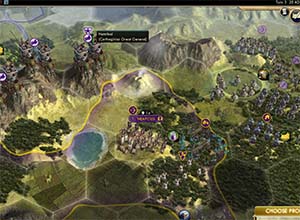
Why merely read about Hannibal crossing the Alps
with war elephants, when I can play it?
On top of the thematic elements, this feature also adds replayability and variety to the game. Every civilization plays differently and has unique strategies associated with it. So it's fun to boot up a game with a new civilization and see how their unique abilities can make you change the way that you play the game. Apparently, there is some controversy about whether this is a positive addition, but for me, there is no question that unique abilities, units, buildings, and so on, is a feature that should be preserved!
Do you have your own personal favorite features and mechanics for Civ V that I missed? Please feel free to post them in the comments! Do you disagree with my list? By all means, post that too!
Join the discussion on Civfanatics:
http://forums.civfanatics.com/showthread.php?p=13854439#post13854439
Listen to the discussion on PolyCast, Episode 236, 18m47s (August 29, 2015):
http://civcomm.civfanatics.com/polycast/polycast/season9/episode236.mp3
And stay tuned for my upcoming list of Top 10 bad ideas.
e0c9eca7-cd83-4140-a7a1-718f8ff1627f|0|.0
Tags:Civilization V: Brave New World, retrospective, Sid Meier's Civilization, civilization, top 10, Civilization V: Gods & Kings, religion, pact of secrecy, diplomacy, tactics, social policies, resource, archaeology, tourism, natural wonder, city state, great work, Civilization V
|

| 12 | | | | | | | 60 | | 11 | | | | | | | 55 | | 10 | | | | | | | 50 | | 09 | | | | | | | 45 | | 08 | | | | | | | 40 | | 07 | | | | | | | 35 | | 06 | | | | | | | 30 | | 05 | | | | | | | 25 | | 04 | | | | | | | 20 | | 03 | | | | | | | 15 | | 02 | | | | | | | 10 | | 01 | | | | | | | 05 |
|